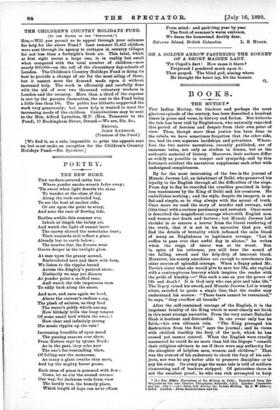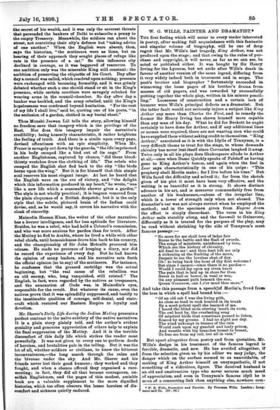BOOKS.
THE MUTINY.* THE Indian Mutiny, the blackest and perhaps the most glorious episode of the century, has been described a hundred times in prose and verse, in history and fiction. But hitherto the tale has been told by Englishmen, who naturally regarded this period of heroism and despair from their own point of view. Thus, though more than justice has been done to the rebels, we have sometimes forgotten that the other side, too, had its own separate hardships and privations. Where- fore the two native narratives, recently published, are of immense value, not only as studies in drama, but as the authentic material of history. Moreover, their authors differ as widely as possible in temper and sympathy, and by this fortunate accident the narratives supplement each other with nndesigned completeness.
By far the most interesting of the two is the journal of Munshi Jeewan Lai, an inhabitant of Delhi, who preserved his loyalty to the English through all the difficulties of the siege. From day to day he recorded the cruelties practised in help- less wantonness by the King of Delhi and his creatures. He embellishes nothing ; and the style, despite its imagery, is so flat and simple, as to ring always with the accent of truth. Once more we read the story of murder and outrage, told (this time) with a curious parsimony and restraint. Once more is described the magnificent courage wherewith English men and women met death and torture; but Munshi Jeewan LaL shrinks in so sincere a horror from the literal rendering of the truth, that it is not in his narrative that you will find the details of brutality which inflamed the calm blood of many an Englishman to legitimate revenge. "Let it suffice to pass over that awful day in silence," he writes when the reign of terror was at its worst. But in spite of his reticence, you still hear the sound of the falling sword and the drip-drip of innocent blood.. Moreover, his scanty anecdotes are enough to corroborate the other stories of splendid courage. When a Sepoy asked Mr. Davis's sister what she would give to save her life, she replied with a contemptuous bravery which inspires the reader with the pride of kinship :—" Has such a one as you the power of life and death ? It is God only who can give and take life." The Sepoy raised his sword, and Munshi Jeewan Lul is wisely silent, satisfied to quote a single line, that the reader may understand his sorrow : " These tears cannot be restrained," he says, " they overflow all bounds."
After the self-contained courage of the English, it is the impotent fatality of the King which is most clearly set forth in this most strange narrative. From the very outset Bahadur Shah is hesitant and distrustful. In one event only has he faith,—his own ultimate ruin. "The King presaged his destruction from the first," says the journal; and he views with childish timidity the fury of the mob, which he has roused yet cannot control. When the English were cruelly massacred he could do no more than bid the Sepoys " consult their religious advisers to see if there were any authority for the slaughter of helpless men, women, and children." That was the utmost of his endeavour to check the fury of his sub- jects, nor was he any better able to preserve discipline or to pay his army. On every page the same tale is told of soldiers clamouring and of bankers stripped. Of patriotism, there is not the smallest proof ; he who was rich attempted to keep • (1.) Two Native Narratives of the Mutiny in Delhi. Transleed from the Originals by the late Charles Theophilus Metcalfe, C.8.1. London: Constable; ana Co. Ms )—(2 ) Daily Life during the Indian Mutiny, By d. W. Shan.r• 0.8.I. London : Swan Sonneniohein and Co.
the secret of his wealth, and it was only the severest threats that persuaded the bankers of Delhi to subscribe a penny to the empty Treasury. Meanwhile, the soldiers ran about the street, not contriving their city's defence but "taking advice of one another." When the English were absent, then, says the historian, "the mutineers were as lions, but on hearing of their approach they sought places of refuge like rats in the presence of a cat." So this infamous city declined in courage, as it was beggared of resources. To one ambition only was the miserable King still constant : the ambition of preserving the etiquette of his Court. Day after day a council was called, which resolved upon nothing; presents were exchanged with becoming formality, and it was grimly debated whether such a one should stand or sit in the King's presence, while certain courtiers were savagely rebuked for wearing arms in the council-chamber. So day after day a banker was heckled, and the army rebelled, until the King's hopelessness was confirmed beyond hesitation. "For the rest of my life I shall live," said be, quoting one of his poets, " in the seclusion of a garden, clothed in my burial sheet."
Thus Munshi Jeewan Lal tells the story, allowing himself no freedom save that imagery which is the privilege of the East. Nor does this imagery impair the narrative's credibility ; being honestly characteristic, it rather heightens the feeling of truth. And there is a simile upon every page, devised oftentimes with an epic simplicity. When Mr. Frazer is savagely cut down by the guards, " the life imprisoned in his body escaped like a bird out of its cage." From another Englishman, captured by chance, "did these blood- thirsty wretches draw the clothing of life." The rebels who escaped the English shot fled back to the city " like birds borne upon the wing." But it is for himself that this simple soul reserves his most elegant image. At last he heard that the English were on the eve of victory, and "the delight which this information produced in my heart," he wrote, "was like a new life which a seasonable shower gives a garden." The style is not wholly practical ; it is leagues removed from the plain eloquence of a British despatch; but it is the only style that the subtle, pictured brain of the Indian could devise, and, as he would say, it covers his narrative with the cloak of sincerity.
Mainodin Hassan Khan, the writer of the other narrative, has a keener intelligence, and far less aptitude for literature. Besides, he was a rebel, who had held a Colonel's commission, and who was more anxious for pardon than for truth. After the Mutiny he fled to Arabia, where he lived a while with other rebel chiefs, until homesickness drove him back to his country, and the championship of Sir John Metcalfe procured him release. He made no pretence of keeping a diary, nor did he record the experience of every day. But he had known the opinion of many leaders, and his narrative sets forth the official opinion (so to say) of the mutineers. For instance, be confesses that the greased cartridge was the actual beginning, but "the real cause of the rebellion was an old enemy, who, long vanquished, still existed." The English, in fact, were regarded by the natives as trespassers, and the annexation of Oude was, in Mainodin's eyes, responsible for the revolt. But whatever its cause, even the natives prove that it was splendidly suppressed, and testify to the inestimable qualities of courage, self-denial, and state- craft which restored our Eastern Empire to loyalty and devotion.
Mr. Sherer's Daily Life during the Indian Mutiny presents a perfect contrast to the naive subtlety of the native narratives. It is a plain story plainly told, and the author's evident geniality and generous appreciation of others help to explain the final suppression of the Mutiny. And it is the terrible discomfort of this daily life which strikes the reader most powerfully. It was not given to every one to perform deeds of heroism, and brutalities pale in the telling. But it was the lot of all, whether soldiers or civilians, to know the bitterest inconveniences,—the long march through the rains and the bivouac under the sky. And Mr. Sherer and his friends never lost their good humour ; they worked and they fought, and when a chance offered they organised a race- meeting; in fact, they did all that became courageous, un- selfish Englishmen, and the pages of this modest, amiable book are a valuable supplement to the more dignified histories, which too often obscure the lesser heroism of dis- comfort and sickness quietly endured.



































 Previous page
Previous page